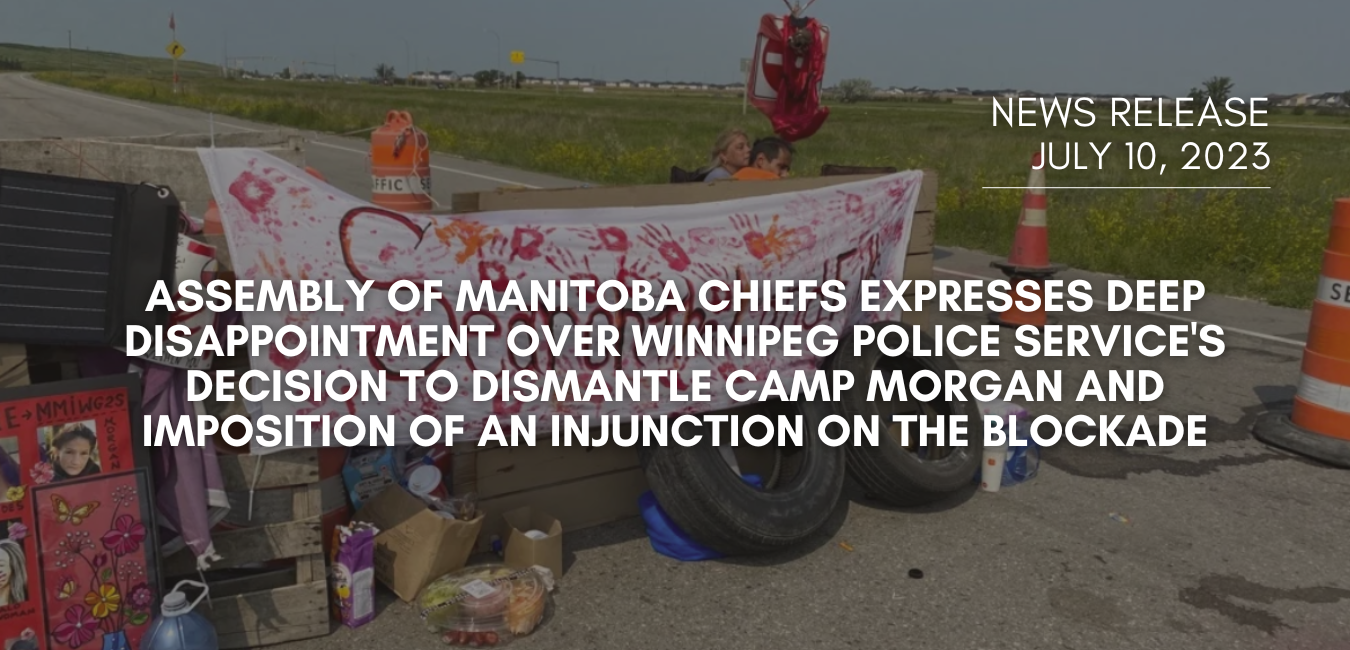AMC Expresses Deep Disappointment over the City of Winnipeg’s Decision to Dismantle Camp Morgan and Imposition of an Injunction on the Blockade

July 10, 2023
Treaty One Territory, Manitoba
AMC Communications
Treaty One Territory, Manitoba – The Assembly of Manitoba Chiefs (AMC) and Chief Kyra Wilson of Long Plain First Nation express profound disappointment over the City of Winnipeg’s decision to dismantle Camp Morgan, a sacred camp believed to be the burial site of three First Nations women. The AMC is also concerned about the injunction imposed on the Camp Morgan blockade, hindering efforts to seek justice for Missing and Murdered Indigenous Women, Girls, and 2Spirit (MMIWG2S+) in Manitoba.
“Camp Morgan, an important symbol of remembrance and healing, has been a place of unity and solidarity for families affected by the tragic loss of their loved ones by Winnipeg’s latest serial killer,” said Grand Chief Cathy Merrick. “It has served as a powerful reminder of the urgent need to address the systemic issues perpetuating violence against First Nations women and girls in our province. It is a place where we have gathered to remind our missing loved ones and those who have tried to stop us that we won’t give up on these women.”
“The dismantling of Camp Morgan and the imposition of an injunction on the blockade not only disregards the wishes of the families who have been seeking justice for their loved ones but also sends a distressing message to First Nations citizens that their pain and calls for justice are being ignored,” Chief Kyra Wilson said. “This action is deeply disheartening and counterproductive to the efforts of reconciliation and healing. If you want the camp to move, honour the feasibility study and the work ahead instead of trying to brush us under the rug again.”
The AMC firmly believes that dismantling Camp Morgan without a comprehensive plan to investigate the disappearance of the three First Nations women is a setback for justice. It undermines the trust and confidence of First Nations, reinforcing the already prevalent skepticism towards the justice system’s commitment to addressing the MMIWG crisis.
In light of recent developments, the AMC also highlights the government’s decision to excavate hazardous material at the Parliamentary Building in Ottawa for a new Visitors Centre. This costly project, estimated to cost nearly 5 billion dollars for both buildings and take a decade to complete, contrasts the lack of investment and urgency in addressing the MMIWG issue. The excavation has already consumed 500 million dollars.
“The government’s willingness to allocate significant funds for excavation purposes while neglecting the critical issue of missing and murdered Indigenous women, girls, and 2Spirit is disheartening. It highlights the ongoing marginalization faced by First Nations citizens,” said Grand Chief Merrick.
The AMC calls on the Winnipeg Police Service and relevant government authorities to reconsider their decision and engage in meaningful consultations with impacted families, First Nations leadership, and grassroots organizations. The voices and concerns of those affected must be heard and respected. Additionally, the AMC urges the provincial and federal governments to prioritize an independent, culturally sensitive inquiry into the systemic causes of MMIWG2S+ cases in Manitoba.
The AMC remains dedicated to advocating for the rights and safety of First Nations women and girls, working towards justice, healing, and reconciliation.
For more information, please contact:
Communications Team
Assembly of Manitoba Chiefs
Email: media@manitobachiefs.com
About the Assembly of Manitoba Chiefs
The AMC was formed in 1988 by the Chiefs in Manitoba to advocate on issues that commonly affect First Nations in Manitoba. AMC is an authorized representative of 62 of the 63 First Nations in Manitoba with a total of more than 151,000 First Nation citizens in the province, accounting for approximately 12 percent of the provincial population. AMC represents a diversity of Anishinaabe (Ojibway), Nehetho / Ininew (Cree), Anishininew (Ojibwe-Cree), Denesuline (Dene) and Dakota Oyate (Dakota) people.